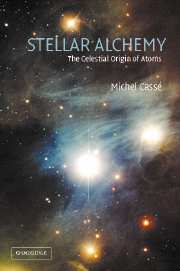Book contents
- Frontmatter
- Contents
- Preface
- Acknowledgements
- 1 Nuclear astrophysics: defence and illustration
- 2 Light from atoms, light from the sky
- 3 Visions
- 4 Contents of the sky: atomic sources and fountains
- 5 Nuclear suns
- 6 Sociology of stars and clouds
- 7 Histories
- 8 Ancient stars in the galactic halo
- 9 Conclusion
- Appendix 1 Invisible matter and energy
- Appendix 2 Supernovas and cosmology
- Appendix 3 Explosions
- Appendix 4 Stellar nucleosynthesis
- Appendix 5 Galactic evolution
- Appendix 6 Key dates
- Appendix 7 Constants and units
- Appendix 8 Websites
- Bibliography
- Index
Appendix 5 - Galactic evolution
- Frontmatter
- Contents
- Preface
- Acknowledgements
- 1 Nuclear astrophysics: defence and illustration
- 2 Light from atoms, light from the sky
- 3 Visions
- 4 Contents of the sky: atomic sources and fountains
- 5 Nuclear suns
- 6 Sociology of stars and clouds
- 7 Histories
- 8 Ancient stars in the galactic halo
- 9 Conclusion
- Appendix 1 Invisible matter and energy
- Appendix 2 Supernovas and cosmology
- Appendix 3 Explosions
- Appendix 4 Stellar nucleosynthesis
- Appendix 5 Galactic evolution
- Appendix 6 Key dates
- Appendix 7 Constants and units
- Appendix 8 Websites
- Bibliography
- Index
Summary
Chemical evolution of galaxies
The key word in modern theory is ‘evolution’. The impressive consistency of the astronuclear view of the heavens has established the idea of an evolution of nuclear species which has the same significance for astrophysics as the evolution of living species for biology. It is itself preceded by an evolution of particle or corpuscular species, which would have been very short, lasting less than 1 second. This process was of a quite crucial nature in determining the components available to build up atoms, that is, those stable particles, protons and neutrons, that serve as the building-blocks, and the forces that bind them together.
Once the elementary particles are produced, nuclear evolution precedes and determines all others, including geological and biological evolution, and its main agent is the stars. There are four main arguments to support the idea of a stellar genealogy for atomic matter. These can be described as the poverty of the ancients, the evolutionary trail, the great galactic cycle, and stellar alchemy. They are not independent of one another. Quite the contrary, they are very deeply related through the dialectic between big and small, astronomical and nuclear.
Note that I do not say ‘infinitely small’, for there are things smaller than atomic nuclei, namely elementary particles. There are also things larger than the astronomical scale of stars and galaxies that concerns us here.
- Type
- Chapter
- Information
- Stellar AlchemyThe Celestial Origin of Atoms, pp. 224 - 229Publisher: Cambridge University PressPrint publication year: 2003



